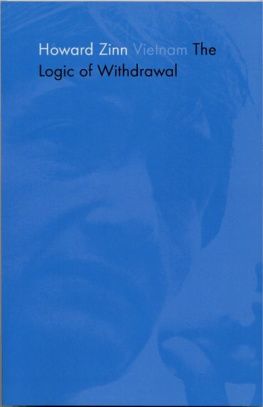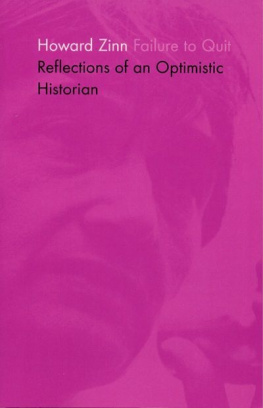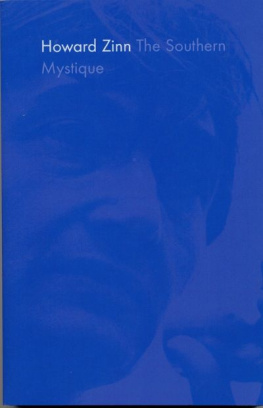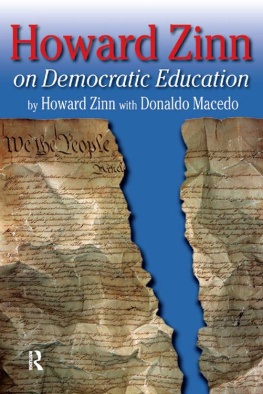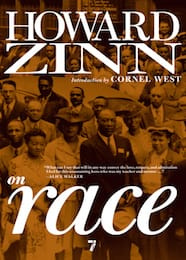
VIETNAM
The Logic of Withdrawal
Howard Zinn
Copyright 1967 and 2002 by Howard Zinn.
Parts of this book have been published, in somewhat different form, in the following journals: Commonweal, The Nation, The Register-Leader, and Ramparts.
Any properly footnoted quotation of up to 500 sequential words may be used without permission, as long as the total number of words quoted does not exceed 2,000.
To the People of Vietnam
Contents
In early August 1964, I was in Mississippi. There was a memorial service in Neshoba County for the three civil rights workers murdered there, and Bob Moses, legendary organizer of the Mississippi movement, stood on the platform, and held up a newspaper with the headline LBJ Says Shoot To Kill In The Gulf Of Tonkin. Moses said: Our government wants us to go halfway around the world to fight a war for reasons no one can understand, but it refuses to protect black people in Mississippi from racist violence. People in the Southern movement had reason to be deeply skeptical of our governments claims to be fighting for freedom and democracy in Vietnam. I soon became deeply involved in the protests against the war. Even as more and more Americans were becoming aware and ashamed that our government was committing atrocities against the population of a tiny country, there was a reluctance on the part of important peopleeven those who were against the warto say simply that the United States should bring its troops and planes home. I decided to write a short book explaining why this was exactly the thing to do, immediately. Vietnam: The Logic of Withdrawal went through eight printings very quickly and was used as a resource by the anti-war movement. The final chapter, a fictional speech by President Johnson withdrawing from the war, was reprinted in newspapers around the country.
VIETNAM, it seems to me, has become a theater of the absurd.
1. By late 1966, the United States was spending for the Vietnam war at an annual rate of twenty billion dollars, enough to give every family in South Vietnam (whose normal annual income is not more than several hundred dollars) about $5000 for the year. Our monthly expenditure for the war exceeds our annual expenditure for the Great Societys poverty program.
2. Early in 1966, a new pacification technique was developed by American soldiers. It involved surrounding a village, killing as many young men as could be found, and then taking away the women and children by helicopter. The Americans called this procedure Operation County Fair.
3. The Pentagon disclosed in 1966 that it had paid to relatives an average of $34 in condolence money for each Vietnamese killed accidentally in American air strikes during that summer. At the same time, according to reports from Saigon, the Air Force was paying $87 for each rubber tree destroyed accidentally by bombs.
4. A New York Times dispatch from Saigon, June 21, 1966:
The United States Air Force turned its attention yesterday to a column of 10 water buffalos sighted along a road just north of the Mugia Pass on the Laotian-North Vietnamese border.
The spokesman said the buffalos were heavily laden with what was suspected to be enemy ammunition. The animals died under fire from F-105 Thunderchief jets. The spokesman said, There were no secondary explosions.
United States Marine pilots also strafed a column of 11 pack elephants in the mountains 35 miles southwest of Danang in South Vietnam yesterday. Five of the animals were killed and five others seen to fall. Again there were no secondary explosions.
5. A Chicago newspaper, asked by a reader if it were true that for every enemy soldier it killed in Vietnam the United States was killing six civilians, replied that this was not true; we were killing only four civilians for every soldier.
6. Covering the Buddhist revolt against the Ky government in early 1966, Life magazine showed a photo of a South Vietnamese soldier coming up behind an unarmed, gowned Buddhist monk and clubbing him unconscious. No comment was made by Life. The same page showed Buddhist demonstrators burning an American motorcycle. This was called an ugly action.
7. At his press conference on March 22, 1966, at a time of expanding warfare and growing casualties in Vietnam, President Johnson said, among other things: If I get real depressed when I read how everything has gone bad here, I just ask for the letters from Vietnam so I can cheer up.
8. The January 16, 1965 Milwaukee Journal reported that a young man who had studied agricultural economics at the University of Minnesota, learning to aid underdeveloped countries improve their yields, was now an Air Force captain and was using his knowledge to point out productive rice fields in Vietnam, so that United States planes could destroy them with bombs and chemicals.
9. In the spring of 1966, a journalist interviewed an Air Force general in Saigon:
Journalist: Let me ask you a philosophical question. What is your reply to those who say we ought to stop our bombingboth North and Southand that would bring us closer to negotiating an end to this war?
General: Well, we were sent out here to do a job, and were doing it, and well stay here until its done.
Journalist: Thank you.
10. In March 1966, President Johnson, talking about Vietnam with Columbia University historian Henry Graff, said proudly (as Graff reported it): I want to leave the footprints of America there.
Isolated oddities can, on investigation, prove to be deviations from an otherwise healthy set of circumstances. Or they may turn out to be small symptoms of a more generalized malady. In such a case, investigation may disclose larger absurdities:
1. The most powerful nation in the world, producing 60 percent of the worlds wealth, using the most advanced weapons known to military science short of atomic bombs, has been unable to defeat an army of peasants, at first armed with homemade and captured weapons, then with modern firearms supplied from outside, but still without an air force, navy, or heavy artillery.
2. Declaring its intent to preserve freedom, the United States has supported a succession of military dictatorships in South Vietnam.
3. Again and again President Johnson has insisted that American forces are in Vietnam to repel aggression and that if theyll go home tomorrow, well go home. Our actions in South Vietnam have been conducted against a force of which 80 percent to 90 percent are already home (that is, in South Vietnam, where they are from) with the rest from North Vietnam, which is not very far from home. Indeed, if the Geneva Accords are to be taken as a basis (as the United States itself agrees), it is all one country, and all our opponents are home. The main fighting against these Vietnamese is conducted now by 350,000 Americans, all of whom are quite far from home, plus 40,000 Koreans, who also are definitely not home. In bombing North Vietnam, our fliers, who are not home, are killing people who are.
4. Government officials have declared that we are at war in Vietnam to stop Chinese expansion. Available evidence is that there are no Chinese troops in Vietnam, nor anywhere else outside of China. China is, indeed, half encircled by American military bases in Korea, Japan, the Philippines, Formosa, Okinawa, and Thailandwith about 250,000 United States soldiers, sailors, and airmen at those bases.
5. The United States maintains it must continue fighting in Vietnam so as not to lose prestige among its allies. As the war has continued, the prestige of the United States in Japan (its most important ally in Asia) and in England, France, and West Germany (its most important allies in Europe) has seriously declined.
Next page
